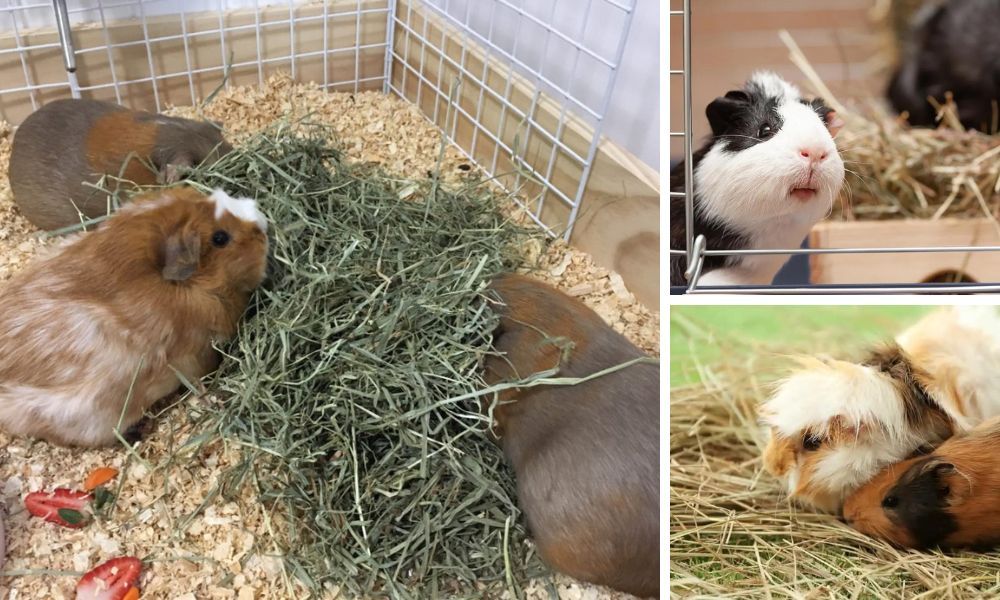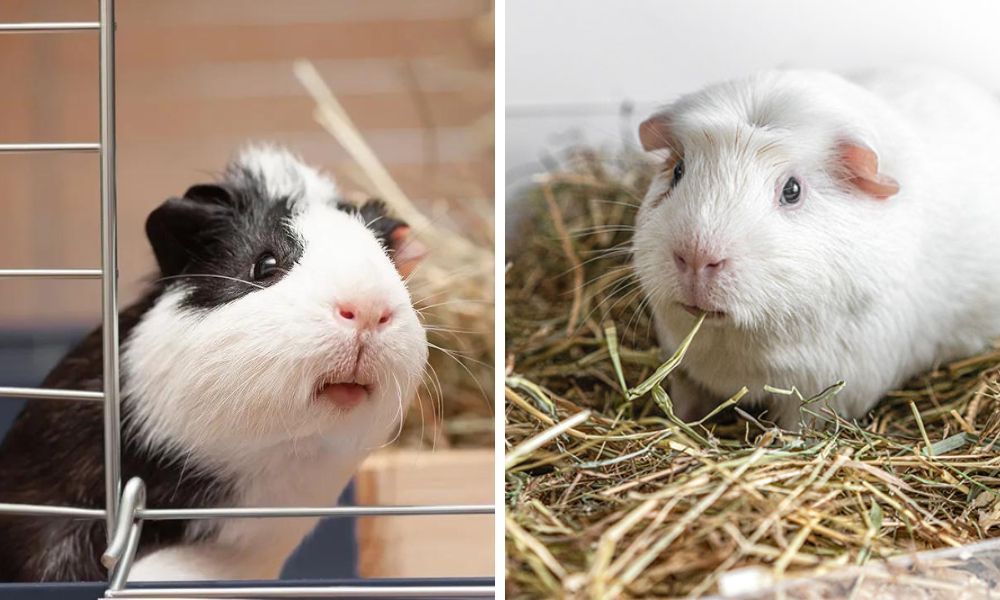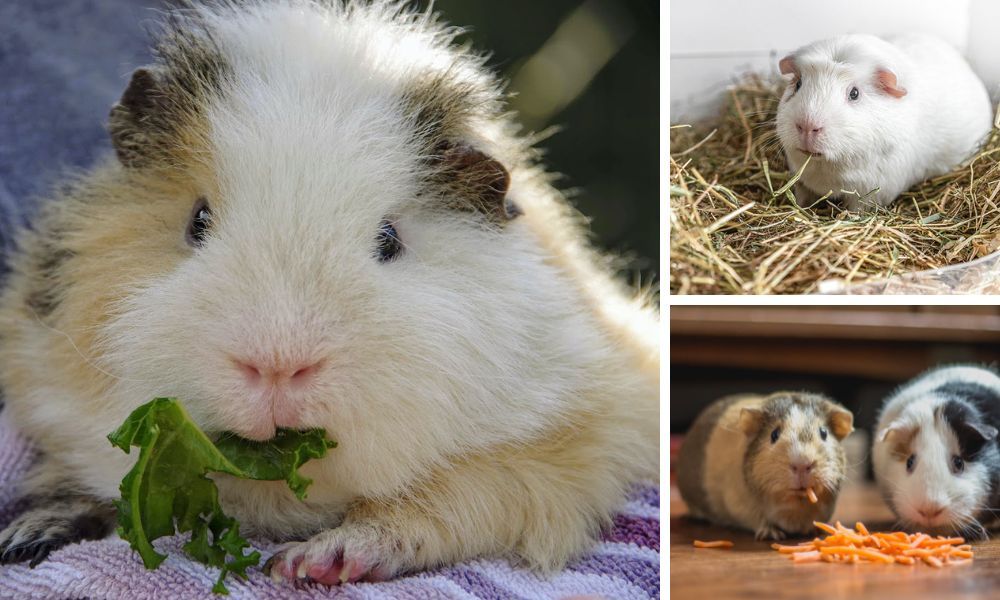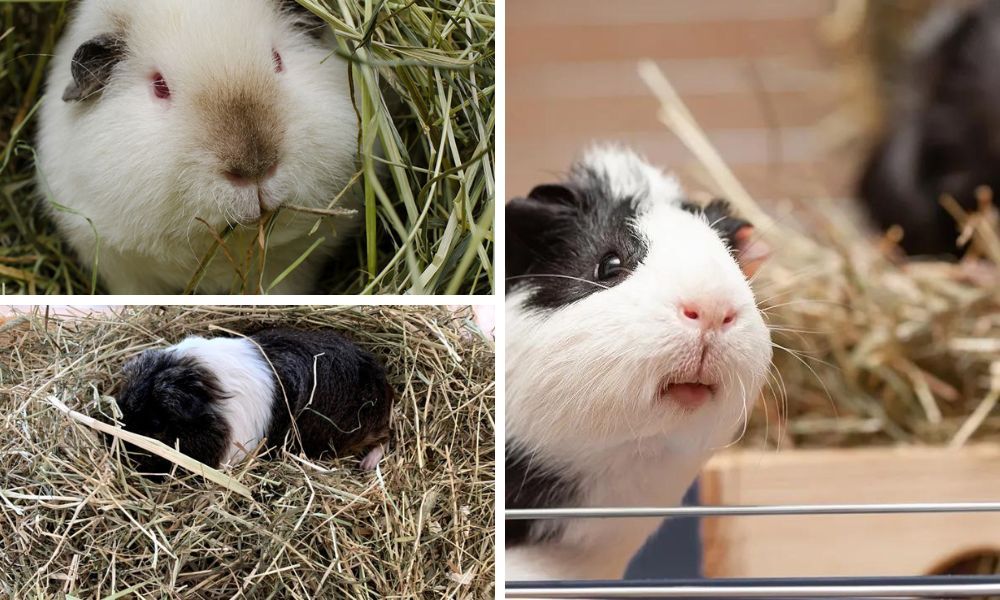Guinea Pig Hay: Understanding the Nutrition Needs of Guinea Pigs and the Role of Hay
Discover what is essential for optimal nutrition of your guinea pig and the role of hay in it! Enjoy reading.

Guinea pigs are adorable, social animals that make great pets. However, keeping them healthy and happy takes a little bit of work. One of the most important aspects of guinea pig care is ensuring they receive a proper diet. In this blog, we will discuss the nutritional needs of guinea pigs and the essential role of hay in their diet.
Guinea pigs are herbivores, which means they only eat plant-based food. Their digestive system relies on a constant supply of fiber to keep things moving along. Lack of fiber can lead to gut stasis, a life-threatening condition in which the gut slows down to a halt. The most important nutritional requirement for guinea pigs is hay, and it should make up at least 80% of their diet.
Guinea pigs, also known as cavies, are lovable, social animals that make great pets. As with any pet, there are certain dietary needs that need to be met in order for your guinea pig to stay healthy and happy. One of the most important components of a guinea pig’s diet is hay.
As loving and responsible pet owners, it is important to understand their dietary needs so that your guinea pig can stay healthy and happy. One of the most important elements for your pet’s diet is hay.
What is Hay?
Hay is dried grass cut into long lengths and kept in a storage container or bundle. It comes in several varieties, but the most important factor when choosing hay for your guinea pig is that it should be fresh with no mold or signs of spoilage. You also want hay with minimal dust or debris that could cause respiratory issues for your pet. Timothy hay is a popular choice for guinea pigs as it has a sweet flavor they love and contains lots of vitamins, minerals, and fiber. If your guinea pig likes timothy hay you can provide an unlimited quantity of fresh timothy hay every day.
Hay is a crucial part of a guinea pig's diet because it provides the necessary fiber to keep their gut working correctly. Hay also keeps their teeth healthy by keeping them worn down. Guinea pigs' teeth grow continuously throughout their lives, and if they don't have something to chew on regularly, their teeth can overgrow and cause pain or other dental problems.

Have You Ever Wondered About What's The Best Hay For Guinea Pigs?
When it comes to choosing hay, timothy hay is the best option for guinea pigs. Timothy Hay so ideal for adult guinea pigs in particular is that it is a grass hay. Alfalfa hay is also a popular choice, but it's high in calcium and calories, so it should be reserved for young, growing guinea pigs or pregnant/nursing females. Other hays such as orchard grass or meadow hay can also be offered but should be given in conjunction with timothy hay. Orchard grass hay for guinea pigs is an excellent choice for guinea pig parents that are allergic to timothy hay. Some pet parents find that their guinea pig may prefer orchard grass if their little one is especially particular to eating the leafy parts of hay. The tasty seed heads in oat hay can be relatively calorically dense compared to timothy hay or orchard grass. The nutritional value of orchard hay is on par with timothy, only being slightly lower in protein, but has an exceptional fiber content. Unlike the other hays mentioned above, alfalfa is more calorically dense in comparison.
What Does Hay Do For My Guinea Pig?
Guinea Pigs Hay is the most important part of your guinea pig's diet and it is essential to your guinea pig's health and happiness. Hay plays an important role in your guinea pig's overall nutrition. Not only does it provide essential vitamins and minerals that your cavy needs to stay healthy and active, but it also helps keep their teeth from growing too long by providing natural abrasives which help wear down excess tooth growth. In addition, hay helps stimulate digestion by providing bulk fiber and roughage for your pet's gastrointestinal system. Finally, hay helps prevent boredom by giving them something to chew on throughout the day!
What kind of hay can guinea pigs eat?
There are a variety of hays available for guinea pigs, but the most recommended type is Timothy hay. This type of hay is high in fiber and low in calcium, making it an ideal choice for adult guinea pigs. Other suitable options include orchard grass and oat hay. It is important to avoid feeding your guinea pig alfalfa hay as it is too high in calcium and protein, which can lead to health issues.
How Does Hay Help?
Hay helps guinea pigs in many ways. Chewing on hay helps promote healthy teeth growth while providing them with much-needed fiber which aids digestion. The vitamin A content in hay helps boost their immune systems while providing energy from natural sugars like glucose and fructose found inside the stalks. Additionally, the calcium in hay helps keep bones strong while helping regulate hormone levels in male animals as well as aiding female reproductive health during pregnancy and beyond.

Nutrition Needs For Guinea Pigs
Guinea pigs have specific nutritional needs in order to stay healthy and active. The main components of their diet should include dust free hay, fresh vegetables, and small amounts of fortified pellets and treats. Hay makes up the bulk of your guinea pig’s diet and should be available at all times. Your guinea pig should also receive plenty of fresh vegetables every day. These can include dark leafy greens like kale, spinach, and chard as well as carrots, apples, peppers, broccoli, celery, and other veggies. Small amounts (1 teaspoon per day) of fortified pellets should be given as well as occasional treats like banana chips or nuts.
The Role Of Hay In A Guinea Pig’s Diet
Hay is essential for keeping your guinea pig’s teeth healthy because it helps wear down their constantly growing incisors which can otherwise lead to dental problems. It also provides fiber which aids in digestion and prevents digestive issues like bloating or constipation from occurring. Additionally, hay provides essential vitamins such as Vitamin C which is crucial for a healthy immune system since guinea pigs cannot synthesize it themselves unlike other animals. It also provides Vitamin B6 which helps break down proteins and carbohydrates more efficiently so your guinea pig has more energy throughout the day! Hay adds variety to your pet’s diet by providing different textures and flavors that would not be found in other foods like pellets or treats alone.
In Addition To Hay
Guinea pigs also need a small amount of fresh vegetables and fruits each day. Dark, leafy greens like kale, spinach, and parsley are great choices. Other vegetables like carrots, cucumbers, and bell peppers can also be given in moderation. Fruits like apples, strawberries, and blueberries provide vitamins and antioxidants, but should also be limited due to their high sugar content.
It's important to note that guinea pigs cannot produce their own vitamin C, which means it needs to be provided in their diet. Along with fresh vegetables and fruits, guinea pig pellets fortified with vitamin C can also be offered as a supplement. However, adding too many pellets to their diet can lead to obesity, so it should be given in moderation. You can read more about the Right balance between Hay and other foods here or by clicking the picture below.

How Much Should I Feed My Guinea Pig?
Guinea pigs should have access to free-choice feeding throughout their day—which means they can eat as much as they need whenever they’re hungry (within reason). A good rule of thumb is to provide ½ cup of fresh timothy hay per 1 pound of body weight each day—so if your guinea pig weighs 2 pounds then you should provide 1 cup daily. In addition to this, you can offer small amounts of other fresh vegetables like carrots, cucumbers, bell peppers, kale, spinach etc., as well as some commercial pellets designed specifically for guinea pigs that contain balanced nutrition like proteins and Vitamin C (which guinea pigs cannot produce naturally).
You should purchse Hay feeders for guinea pigs because they can help reduce the amount of mess and wasted hay overall. You can put hay in hay feeder or a hay rack, a cardboard box, etc. Keep hay off the floor to avoid it from being soiled by your piggies' urine since guinea pigs can't and won't eat soiled hay. Provide fresh hay daily for your guinea pigs and ensure it's roughly a large handful each of hay for each guinea pig you own. Happy feeding!

How Much Hay Does Your Guinea Pig Require?
We all know that a good quality hay is essential for our piggy friends. Feeding your beloved guinea pig properly will help ensure they live a long, healthy life including plenty of playtime! Hay forms an integral part in providing them with essential nutrients such as Vitamin A, Vitamin B6 & B12, Calcium & Iron—just to name a few—and promotes overall digestive health too! If supplied correctly with fresh food sources such as Timothy Hay along with other vegetables &/or commercial pellets then you can rest easy knowing you’re doing all you can to take care of your furry friend! Guinea pigs that aren't provided with enough hay often overeat other foods, gain weight and become obese.
Hay plays an essential role in keeping your guinea pig healthy and happy! Not only does it provide essential vitamins and minerals that they need to stay active but it also keeps their teeth at a manageable length while stimulating their digestion system with bulk fiber and roughage. As a general rule of thumb, make sure you provide 1-2 cups (or more during periods of rapid growth) along with plenty of fresh water each day for optimal health results! If you are interested in learning more about the benefits of feeding your guinea pig hay, we have created blog about it and you can read it here.
So there you have it—an overview of the nutrition needs of guinea pigs with an emphasis on the importance of hay in their diets! As a pet owner, it is important to make sure that your pet receives all the nutrients they need to stay happy and healthy! Make sure to feed them plenty of hay along with fresh vegetables plus small amounts of fortified pellets each day! With these tips in mind, you will be well on your way to having a happy and healthy pet!
At the end...
In conclusion, understanding the nutritional needs of guinea pigs is essential for their health and well-being. Hay is the most crucial part of a guinea pig's diet, providing the fiber they need for a healthy gut and keeping their teeth trimmed. Along with hay, fresh vegetables, and fruits should be offered in moderation, along with vitamin C-fortified pellets. A well-rounded diet, along with plenty of love and attention, will help keep your guinea pig happy and healthy for many years to come.
Looking for a high quality hay for your guinea pig? We have done all the research for you and put together our list of top 5 high quality hays for guinea pigs you can buy today! Tap the button below to see the list now!

